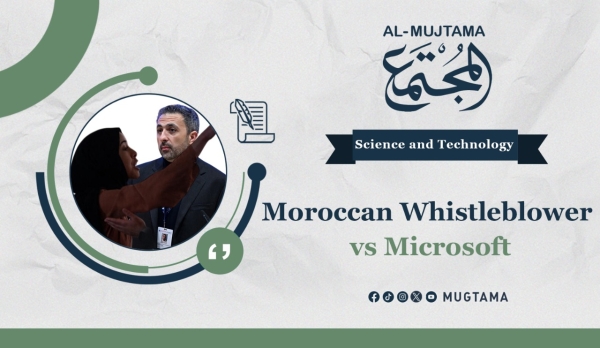Microsoft's Bloody Hands: Moroccan Engineer Exposes the Company’s Complicity in the Genocide in Gaza
In a moment that embodied personal courage and a living conscience within one of the world’s largest tech companies, Moroccan engineer Ibtihal Aboussad confronted Microsoft’s leadership, accusing the company of complicity in the genocide committed by the Israeli military in the Gaza Strip.
During the 50th-anniversary celebration of Microsoft, Ibtihal Aboussad —a Harvard graduate and software engineer on Microsoft’s AI team—stood on stage and shouted at Mustafa Suleyman, the Syrian-born CEO of the AI division:
"Shame on you! You’re a war profiteer! Stop using artificial intelligence for genocide in our region. Your hands are stained with blood. How dare you celebrate while Microsoft is killing children?!"
Supportive Reactions
This scene was enough to ignite a wave of interaction and support across social media, where Ibtihal was seen as a rare example of moral conscience and ethical heroism in an era of compliance and complicity.
Ibtihal later sent an email to all Microsoft employees explaining her stance. She revealed that her AI work had been indirectly used to support the occupation and exposed previous employee attempts to object—attempts that were met with dismissal and intimidation.
The Islamic Resistance Movement (Hamas) issued a statement commending Ibtihal’s stance, describing her as a role model. The statement declared that her heroic position had exposed the complicity of major tech companies with the Zionist killing machine and that she had taken a stand for justice despite potential consequences.
The movement called on all employees in such companies to follow Ibtihal’s example and urged the United Nations and international human rights organizations to document this technological complicity and hold the involved companies accountable.
How Did Microsoft Support the Aggression on Gaza?
What Ibtihal exposed was not a cry in the void—it aligned with well-documented international investigative reports.
At the beginning of 2025, an investigation by the Associated Press revealed that Microsoft and OpenAI’s AI models had been used in an Israeli military program to select bombing targets during Israel’s war on both Gaza and Lebanon, according to Reuters.
In another extensive investigation published by The Guardian, the British newspaper exposed Microsoft’s deepened technical cooperation with the Israeli military, especially after the launch of its assault on Gaza on October 7, 2023.
The investigation, conducted in partnership with Israeli outlets +972 Magazine and Local Call, relied on leaked documents obtained by Drop Site News and interviews with key figures in Israel’s security and intelligence community.
Rapid Expansion of Cloud and Intelligence Support
The investigation revealed an unprecedented increase in the Israeli military’s reliance on Microsoft’s cloud services and AI technologies during the peak of its military campaign on Gaza. The report confirmed that the American tech giant provided expanded data storage and processing services to the Israeli army, signing contracts worth no less than $10 million for thousands of hours of direct technical support.
According to the documents, the Israeli military faced a sudden strain on its technological infrastructure following the start of the assault, prompting a rapid expansion of its systems and increased dependency on cloud service providers—most notably Microsoft, Amazon, and Google.
Use of Azure in Combat and Intelligence Operations
The report uncovered that Microsoft’s Azure platform was not merely used for administrative tasks within the Israeli army, but played a direct role in combat and intelligence operations. Units from the air, land, and naval forces—as well as the military intelligence directorate—relied on Azure for data analysis, operations management, and target selection.
The documents showed that Microsoft was classified as a “trusted partner” of Israel’s Ministry of Defense, repeatedly commissioned to work on highly sensitive and classified projects. Microsoft employees were reported to have worked directly with Unit 8200, Israel’s elite electronic surveillance unit, as well as Unit 81, which specializes in developing espionage technologies.
Expanded Access to GPT-4 Tools
The investigation noted that Microsoft granted the Israeli military extended access to the GPT-4 model developed by OpenAI—the engine behind ChatGPT. This was part of a deep partnership with OpenAI, which recently updated its policies to allow collaborations with military and intelligence entities.
Uses Involving Surveillance and Systematic Killing
The investigation documented several sensitive uses of Microsoft’s services, including:
1. Use of Azure by Units 8200 and 81 to analyze data and develop advanced espionage tools.
2. Reliance on Microsoft technologies in managing the “Rolling Stone” system, used to track Palestinian movement in the West Bank and Gaza.
3. Use of Microsoft’s email and communications systems by Unit Ofek (Air Force Tech Unit) to manage target databases—known as “target banks.”
4. Deployment of Microsoft AI in air-gapped systems (offline networks), indicating its use in extremely sensitive missions.
"Mass execution factory"... AI supporting IDF
Massive Surge in Consumption of Services
The Guardian reported that the Israeli military’s use of Microsoft’s cloud storage services increased by 60% during the first six months of the war, compared to the previous period. Use of AI technologies also surged, with machine learning tool consumption in March 2024 being 64 times higher than in September 2023.
Deafening Silence from the Company and the Army
Despite the evidence, Microsoft refused to comment on the investigation’s findings. Likewise, Israel’s Ministry of Defense and military declined to issue any official response, merely stating:
"We will not comment on this matter."
When Robots Decide Who is a Target
-------------------------------------------------------------


